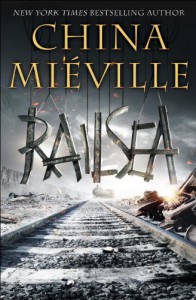Currently reading
A Creature of Moonlight
Saffron And Brimstone: Strange Stories
Captain Vorpatril's Alliance
Snow in May: Stories
 Huh! I just learned two things. When an author uses a 'descriptive' name for a character, there's a term for that: aptronym, probably coined in the 1930s by newspaper columnist Franklin P. Adams. There's also a phrase for when a person has a name which relates to their chosen profession: nominative determinism.
Huh! I just learned two things. When an author uses a 'descriptive' name for a character, there's a term for that: aptronym, probably coined in the 1930s by newspaper columnist Franklin P. Adams. There's also a phrase for when a person has a name which relates to their chosen profession: nominative determinism.Now, if this were universally true, I guess China Miéville should have gone into Asian studies or something... but since I've loved the theory since I came across an article claiming that boys with the name "Dennis" were 10x more likely to become dentists, I'm probably seriously subject to confirmation bias, but, reading Railsea, I can't help but wonder if there's a Melville/Miéville connection.
Personally, I don't like Herman Melville. I went through a phase of reading all the whaling history and fiction I could get my hands on, as a great many of my relatives were on whaling ships. As a matter of fact, the incident that Moby Dick was based on involved members of my family (call me bizarre, but it's kind of fun that my ancestral cousin was a cannibal ). (And what Moby Dick was based on, not anything to do with buses on Staten Island. Damn artists! [http://fhsi.wordpress.com/2011/09/20/the-snug-harbor-bus-stop-that-inspired-herman-melville-greatest-novel/]) He also lifted one of my ancestral family names, Starbuck, but he's not the only person to rip off that name, the ripping-off that Melville did has been fully eclipsed by caffeinated beverages.
Anyway, sorry, but Moby Dick has to have been one of my very least favorite whale tales out of the dozens that I read. (And 'Billy Budd'? Even Worse.)
Miéville disagrees. 'Railsea' begins as a straight-up homage to Moby Dick, lifting incidents and anecdotes pretty much directly (from what I recall.) The differences: instead of ships, the vehicles here are trains, and instead of whales, the beasts under pursuit are Giant Moles. The train crews are terrified to ever touch the ground, because if they do, Giant Moles will instantly swarm up and eat you. Luckily, with the exception of raised "islands" and "continents" of actual land (bedrock?), where civilians live, the ground is massively crisscrossed with train tracks, extending as far as known geography.
I have to admit, it took me a while to get into this book. At first, I found the Moby-Dick-allusions tiresome and unoriginal, and I also felt that it was rather juvenile (this is marketed as YA). Giant moles? Kind of silly.
However, once the actual plot of the book got going (which is NOT the plot of Moby Dick), it really picked up. I also have to admit I enjoyed how it was simply the expected thing, here, that all captains would have an obsession with a giant and dangerous beast (or, a "philosophy.") The descriptions of the Railsea itself were stifling and oppressive - but they're meant to be, and it all comes clear at the end - with some obvious-but-not-too-bludgeony social messages about the dangers of letting huge corporations take over.
I still love Miéville, and I'd say this book is worth reading, for fans, but it's not where I would recommend anyone new to Miéville should start. It is a YA book, with orphans and questing and coming-of-age and all that stuff. It reminded me quite a lot of Paolo Bacigalupi's YA book, 'Ship Breaker.' Both writers definitely come from a very similar thematic standpoint - and both have stronger, more complex statements in their non-YA publications.






